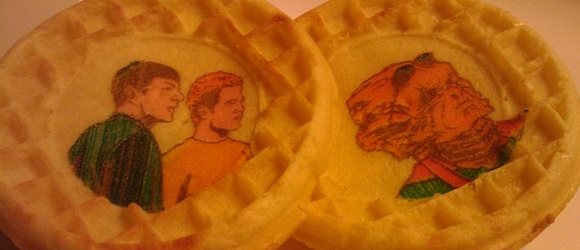Is Star Trek Unpalatable to the Television Industry’s Modern Tastes?
To Boldly Go
Spinoff Online raises an interesting question: is there anything on television these days that’s like Star Trek? And are our current crop of successful television shows teaching executives that something like Star Trek doesn’t work?
Graeme McMillan‘s argument runs primarily on the unique structure of Star Trek shows. Technically the show is a procedural: thing-of-the-week episodes are the norm, generally the setting and cast of coworkers remains the same from episode to episode, and while the occasional two-part season finale or opening brings the characters to levels of thrilling suspense from dangers greater than they have seen all season, there isn’t a overarching plot to the series that must be furthered in some way every episode.
At the same time, the shows presented a wide range of tone from episode to episode, from various forms of comedy to various forms of drama, which McMillan lays out amusingly as including, but not limited to, the “This is an allegory for a real-world situation and we shall all be making a Very Serious Point” variety, the “We’re trying to make a suspenseful thriller, so expect long looks punctuated with stirring soundtrack strings” variety, and the “Want an action movie in less than an hour? We’ll do our best, but don’t judge us too harshly” variety.
These two factors, the shows’ procedural natures and the unpredictability in tone, McMillan says, sets Star Trek apart from pretty much anything on television these days. We’ve certainly got plenty of procedurals, what with being able to watch some kind of Law & Order or CSI at pretty much every hour of the day, and that’s discounting all the similar clones like NCIS and Cold Case and The Closer and Criminal Minds. But the lesson the success of those shows teaches is that viewers will come back for each episode because they know exactly what they’re getting. Twenty minutes into the episode? Nah, this guy can’t possibly be the killer. Time for another crime lab montage set to techno music!
At the same time, when was the last time we saw a successful science fiction show that didn’t take its meta-plot very seriously? Lost, Heroes, and Battlestar Galactica (and though it’s only got one season under its belt and its secrets are already out, one could argue that Game of Thrones belongs in this category, too) were successful not least because watchers became obsessed with the long game of whittling secrets out of the intricate plots. It’s been a long time since The X-Files captivated by only teasing us with it’s long plot once or twice a season and giving us monsters the rest of the time.
Speaking of the X-Files, there’s one other long dead show that fits McMillan’s description of Star Trek. A procedural with wildly varying tone from episode to episode that only occasionally spent time furthering a larger plot once or twice a season. Here’s hoping that at least one of the CW’s Deadman and Fox’s The Spectre and ABC’s Hulk and Jessica Jones series pick up this legacy.
In any case, we think McMillan’s really on to something here in explaining why nobody in the television industry is really gung-ho to put Star Trek back on television, when every Star Trek show out there is like nothing that’s on TV these days. Just on Netflix, thank Q.
Read the whole article at Spinoff.
Have a tip we should know? tips@themarysue.com
